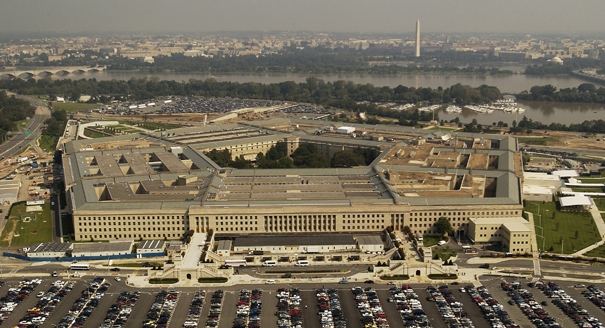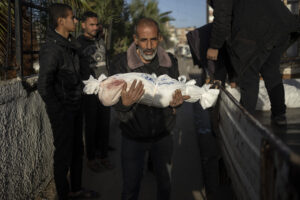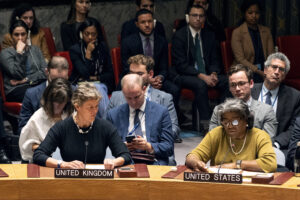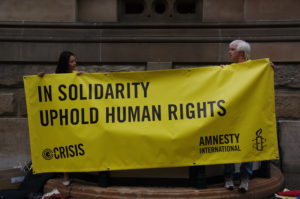U.S. Domestic Surveillance Papers Raise Rights Concerns
Human Rights Watch warns that vague policy could target those exercising legitimate free expression, especially Muslims. Associated Press
Associated Press
New documents obtained by Human Rights Watch reveal a Department of Defense policy that seems to allow monitoring of U.S. citizens and green card holders deemed by the executive branch to be “homegrown violent extremists”—even when they have “no specific connection to foreign terrorist(s).”
The organization says that the documents, obtained by a Freedom of Information Act request, raise concerns about the government’s ability to gather data on citizens without obtaining a warrant. The group is especially concerned that “people who are exercising their legitimate, free-expression rights will be targeted for monitoring in a discriminatory or arbitrary manner”:
The new materials … are training modules that primarily concern Executive Order 12333. That order broadly governs the US intelligence agencies’ activities, and includes provisions allowing the agencies to collect information on US persons—meaning US citizens and lawful permanent residents, as well as some corporations and associations—in a manner the government has never fully explained to the public. The training slides largely summarize Defense Department procedures concerning EO 12333 that were released in 2016, updating a 1982 version. Using plain language to demystify the procedures’ phrasing, the slides offer hints about Defense Department intelligence practices that require further inquiry and exposure.
“These documents point to just how thoroughly the public has been kept in the dark about warrantless surveillance under Executive Order 12333,” said Sarah St.Vincent, US surveillance and national security researcher at Human Rights Watch. “Their explanations of the order suggest that the government may be carrying out monitoring that poses serious problems for human rights, and Congress should seek more information about what the intelligence agencies are doing in this respect.”
In an interview with Aaron Maté of The Real News, St.Vincent said that the documents are especially disconcerting because they lack qualifiers to determine who might fall under the umbrella of “homegrown violent extremists.”
“I wouldn’t want to speculate, but I think that it’s potentially significant that the training slides refer to the San Bernardino and Orlando shooters, which suggests to me a potential focus on Muslims,” she said. “But I think what we should all really focus on is this idea that … homegrown violent extremists, when you don’t have a definition, or you don’t have criteria, I think there’s a real danger that that could be applied to a really wide spectrum of people who are potentially just expressing their political opinions or their religious views, and for whom there is no, as we say in the criminal justice field, ‘probable cause’ to believe they’re going to commit a crime or engage in an act of violence. I think that when the focus is on this so-called ‘extremism,’ that is to say, apparently, the beliefs, that you risk having people get caught in a dragnet who really don’t belong there.”
That the vague policy could be applied disproportionately to Muslims is especially alarming after President Trump’s inflammatory remarks on Twitter following Tuesday’s shootings in New York City, in which eight people died:
Would love to send the NYC terrorist to Guantanamo but statistically that process takes much longer than going through the Federal system…
— Donald J. Trump (@realDonaldTrump) November 2, 2017
The vagueness of the classification “homegrown violent extremist” is also of concern in light of Trump’s varying responses to acts of violence. CNN notes his very different reactions after the Oct. 1 mass shooting by a white man in Las Vegas and Tuesday’s New York City attack by a man allegedly inspired by Islamic State. In the wake of the Las Vegas incident, Trump refused to discuss gun control when pressed by reporters. But he was quick to urge more “extreme vetting” by Homeland Security just four hours after the Manhattan attack.
I have just ordered Homeland Security to step up our already Extreme Vetting Program. Being politically correct is fine, but not for this!
— Donald J. Trump (@realDonaldTrump) November 1, 2017
Read the Human Rights Watch documents here.
Your support matters…Independent journalism is under threat and overshadowed by heavily funded mainstream media.
You can help level the playing field. Become a member.
Your tax-deductible contribution keeps us digging beneath the headlines to give you thought-provoking, investigative reporting and analysis that unearths what's really happening- without compromise.
Give today to support our courageous, independent journalists.





You need to be a supporter to comment.
There are currently no responses to this article.
Be the first to respond.